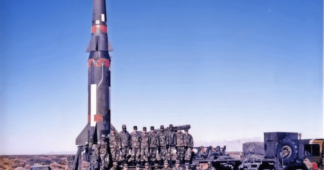Aug. 30, 2024
“Escalation dominance defines a situation in which a nation has the military capabilities that can contain or defeat an adversary at all levels of violence with the possible exception of the highest.”
– Reagan Administration’s Commission on Integrated Long-Term Strategy, “Discriminate Deterrence,” 1988.
There is no greater strategic madness than the belief that nuclear superiority must be maintained at each rung of the nuclear ladder in order to maintain deterrence. U.S. weapons technology was a major driver of escalation dominance throughout the 1950s and 1960s along with the belief that the Soviet Union would move to a level of nuclear conflict that the United States could not counter. “Dr. Strangelove or How I Stopped Worrying and Learned to Love the Bomb” parodied these fears, and the arms control and disarmament developments of the 1970s and 1980s helped to defuse them. Sadly, the Biden administration has taken a step that suggests a return to escalation dominance, which will spiral a Pentagon budget that will soon reach $1 trillion per year.
“Dr. Strangelove” remains the greatest of movie satires for a host of reasons, not least that it hews so closely to the real-life absurdities of two saber-rattling superpowers—the United States and the Soviet Union—escalating an arms race that could only end in mutual annihilation. Now we have a third superpower—China—that is expanding its nuclear arsenal, and the Biden administration has approved a highly classified nuclear strategic plan—the Nuclear Employment Guidance—that seeks to prepare the United States for possible coordinated nuclear challenges from Russia, China, and North Korea. According to David Sanger in the New York Times, the document is so highly classified that “there are no electronic copies, only a small number of hard copies distributed to a few national security officials and Pentagon commanders.
The importance of escalation dominance in the Cold War was driven by such Cold Warriors as Paul Nitze, who argued that a Soviet nuclear attack would enable the Kremlin to hold the American population hostage and to dictate the terms of peace. Nitze added that the Soviet Union’s “effective civil defense program” would keep Soviet casualties to two to four percent of their population, a cost that Moscow would be willing to pay to achieve “dominance.” These absurd notions encouraged the Kennedy administration in the early 1960s to advise U.S. families to build bomb shelters as protection from atomic fallout in the event of a nuclear exchange with the Soviet Union. President John F. Kennedy said the government would provide such protection for every American; in the 1980s, President Ronald Reagan guaranteed protection in the form of his Star Wars missile defense.
Only the United States has spent billions of dollars in the pursuit of a missile defense shield over the entire country. I wrote about this 25 years ago in a book titled “The Phantom Defense: America’s Pursuit of the Star Wars Illusion.” Now, European leaders are talking about a “European Air Shield,” and the Heritage Foundation—Donald Trump’s think tank—favors a missile defense system that would destroy over 100 incoming missiles. Trump’s flawed reference to the success of Israel’s Iron Dome defensive system is also illusory because it intercepts small short-range rockets fired by militants in the region and not ballistic missiles.
The next president will inherit a nuclear landscape that is more threatening and volatile than any other since the dangers of the Cuban missile crisis more than 60 years ago. China is expanding its nuclear arsenal; Russia is threatening the use of nuclear weapons against Ukraine and warning about World War III; Iran’s nuclear program is expanding rapidly in size and sophistication; and North Korea reportedly has a nuclear arsenal that rivals three nuclear states that never joined the Non-Proliferation Treaty: Israel, India, and Pakistan.
The close ties between China, Russia, Iran, and North Korea are feeding Washington’s nuclear paranoia. Washington’s failure to hold substantive discussions with these four countries makes the potential for conflict more real. Our obsession with terrorists obtaining nuclear weapons adds to the exaggeration of the threat and our distorted strategic spending. The fact that Donald Trump may return to the White House, where he once boasted about the size of his nuclear button and promised to return America’s nuclear arsenal to the “top of the pack,” adds to nuclear uncertainty.
Russia and China are willing to enter discussions on nuclear matters with the United States, but only as part of a larger strategic discussion on the tensions and challenges that confront Washington’s bilateral policies with both Moscow and Beijing. President Biden’s administration has refused to enter such an expanded dialogue, which is a major failure in its national security strategy. It is essential for the three major nuclear powers to discuss arms control, risk reduction, and the importance of nonproliferation; the United States is primarily responsible for the failure to begin a dialogue. Instead, Biden and his national security team have been preoccupied with ways to interfere in the broader China-Russia relationship, which has never been stronger. In fact, it has been Washington’s opposition to Sino-Russian relations that has led Moscow and Beijing to bolster their ties.
The United States has been lacking serious disarmament specialists at the highest levels of the government since the Obama administration when John Kerry was secretary of state and Rose Gottemoeller was undersecretary for arms control and international security and assistant secretary of state for verification, compliance, and implementation. Kerry and Gottemoeller were fighting an uphill battle because of President Bill Clinton’s decision in 1997 to abolish the Arms Control and Disarmament Agency, which seriously weakened the entire arms control community in the United States. ACDA’s demise as an independent voice for arms control weakened national security by narrowing arms control options for presidential decision making.
Unfortunately, we’re in an election season with both candidates battling over who would create a more lethal military force and increase military spending, The campaign thus far has featured no reference to arms control and disarmament. The United States is already responsible for half of the global spending on the military, and is the world’s only country that has power projection capabilities that involve every corner of the globe. Our nuclear inventory contains more warheads than there are strategic targets, and this is certainly true for the other nuclear powers around the world. There is no greater shared irresponsibility in the international community than the secret decisions that led to the overkill capabilities in the nuclear inventories of the nine nuclear powers. It will take a serious act of statesmanship to stop the fear-mongering delusions that could once again shape our nuclear weapons policy.
We remind our readers that publication of articles on our site does not mean that we agree with what is written. Our policy is to publish anything which we consider of interest, so as to assist our readers in forming their opinions. Sometimes we even publish articles with which we totally disagree, since we believe it is important for our readers to be informed on as wide a spectrum of views as possible.











